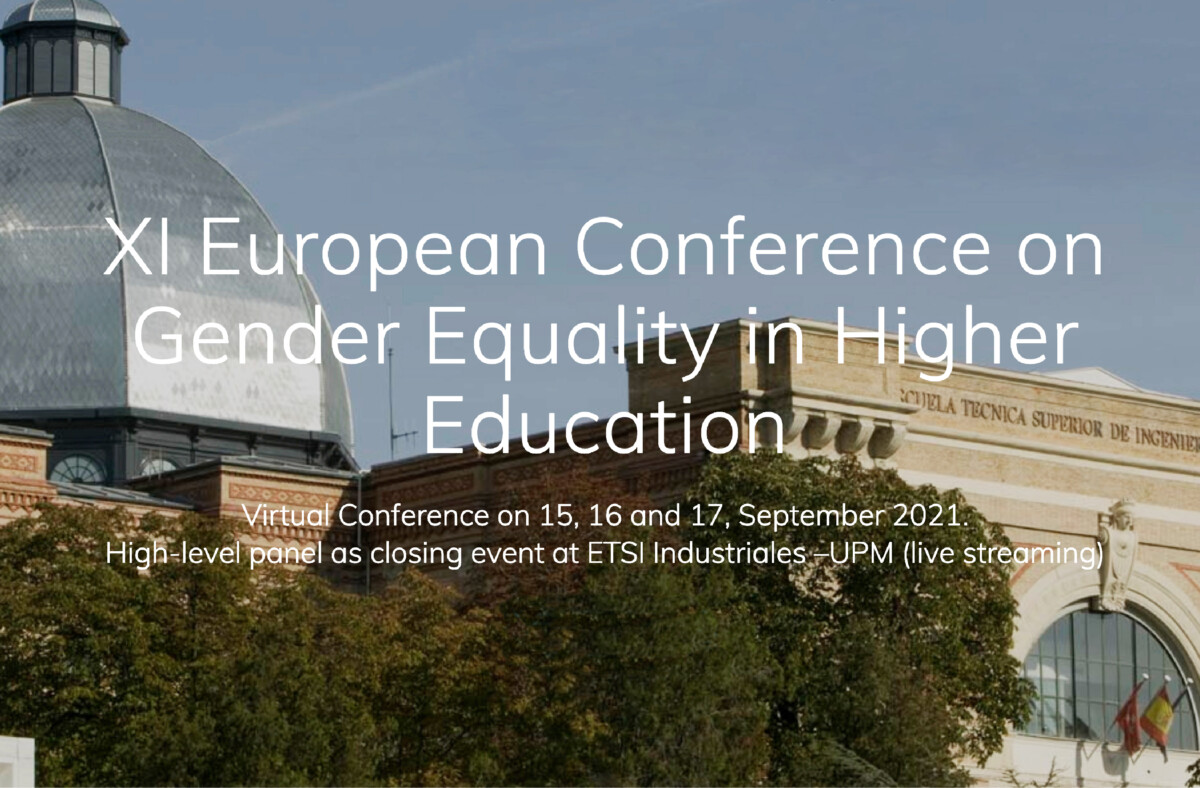The XI European Conference on Gender Equality in Higher Education is approaching
By the Local Committee of the 11th GEHE Conference
The Spanish institutions organizing the 2021 online edition of the GEHE Conference (15th – 17th September) are proud to present an inspiring and diverse program with high-level contributions received from the gender & science community and practitioners. Our goal is to provide the space for them to share their knowledge and expertise so that the public authorities can design better and more effective policies.
When the organizers of the XI GEHE Conference had to take the difficult decision to postpone the 11th GEHE Conference to September 2021, the situation was uncertain both due to the global health emergency and in relation to the organization of the Conference. Today, after considerable efforts to launch a new call for abstracts in 2021 and to adapt the whole program to an online event, the organizers are glad to communicate that the agenda for the upcoming 11th edition of the GEHE Conference has been published in our website and the registration has been closed.
Since the beginning of 2021, the Women and Science Unit of the Spanish Ministry of Science and Innovation, the Ministry of Universities, the Spanish Foundation for Science and Technology and the Universidad Politécnica de Madrid, with the financial support of the Spanish Institute for Women, resumed work on the organization of the Conference. First, the organizers decided to open a new call for abstracts in order to give the opportunity to present new works. Indeed, given the importance acquired by the impact on the confinement in women’s research careers and the sex/gender analysis of research on covid-19, the organizers added a new topic. Then, our international scientific committee once again proceeded to evaluate the new proposals submitted following the same evaluation criteria. Taking into account both 2020 and 2021 call for abstracts, this 11th edition received more than 200 proposals, what can be considered as a success of the Conference given the difficult conditions. The organizers are grateful to the scientific community and practitioners for their committed work revealing persistent inequalities and producing valuable knowledge to build better science and innovation systems.
The online registration process was opened during June and thanks to the dissemination work conducted, more than 300 people have registered for the Conference. Our attendees come from institutions in 23 different countries, mostly European countries, but also Brazil, Canada, India, South Africa, among others. This is indicative of the global dimension of this research field and the interest in advancing gender equality policies in R&I in different global regions.
As a result of all these joint efforts, the agenda for the three days of the Conference includes 144 oral communications and 12 workshops/symposia on the different topics of the Conference. Attendees will be able to choose between more than 30 experiences with gender equality plans, more than 20 discussions on fostering scientific-technical vocations and more than 30 presentations on the integration of the gender dimension in university teaching, among other topics. The impact of the confinement on women’s research careers, to give another example, will be addressed by at least 10 presentations. In addition to workshops and oral communications, around 30 posters on the different topics will be exhibited in an ad-hoc space of the online platform of the Conference.
Moreover, the program offers two plenary conferences on the 15th and 17th. Thamar Heijstra (University of Iceland) will give the opening lecture “Academic career making in a gendered environment: Men as the norm, women as the deviant and feminists as double deviants”, while the closing conference “Building feminist futures in European research: major shifts, continued contestations, new challenges” will be in charge of Marcela Linkova (chair of the ERAC Standing Working Group on Gender in Research and Innovation). The conclusions of the three days of the Conference will be addressed during the roundtable on gender equality policies in R&I moderated by the head of the Women and Science Unit. This panel includes high-level profiles at the European level, including representatives from EU institutions, civil society and academics.
The organizers hope that this interesting and inspiring program due to the high-level contributions received from the gender & science community and practitioners will contribute to reinforce the knowledge production on gender equality policies in R&I and will motivate further steps at national and supranational levels. Last but not least, the Conference discussions will be enriched by the participation of researchers, practitioners and students as attendees to the Conference. All of them are invited to learn as much as possible from the oral communications, posters and workshops/symposia as well as to make new professional contacts taking advantage of the online networking space provided by the online platform. One of the objectives of this Conference is also to enhance the European Network on Gender Equality in Higher Education, precisely in times of difficult connections and gendered impacts of the global health emergency at all levels.
For more information about the XI GEHE Conference visit the website and the Twitter profile.



